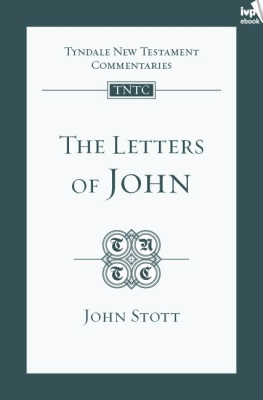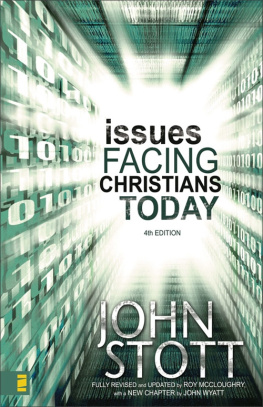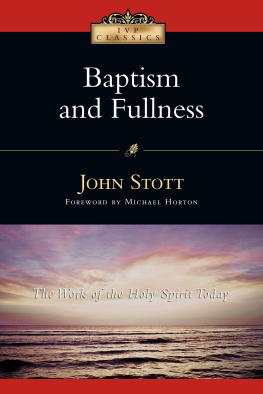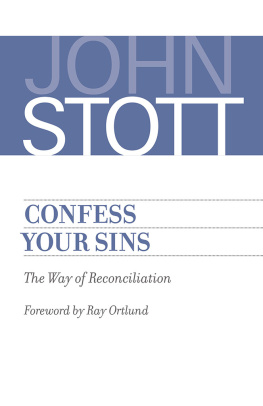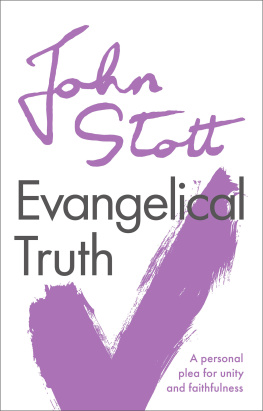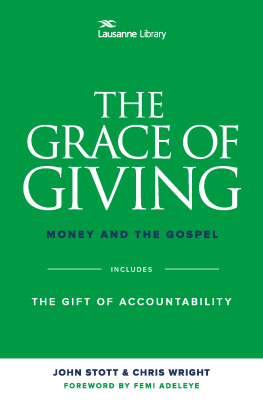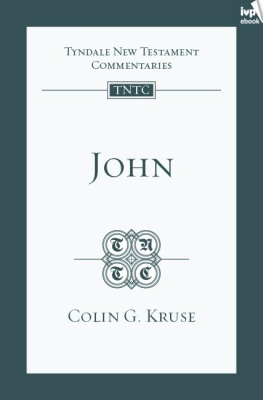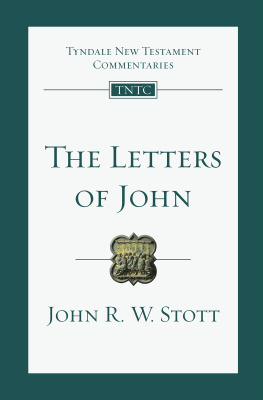John Stott - Letters of John (TNTC)
Here you can read online John Stott - Letters of John (TNTC) full text of the book (entire story) in english for free. Download pdf and epub, get meaning, cover and reviews about this ebook. year: 2009, publisher: IVP, genre: Religion. Description of the work, (preface) as well as reviews are available. Best literature library LitArk.com created for fans of good reading and offers a wide selection of genres:
Romance novel
Science fiction
Adventure
Detective
Science
History
Home and family
Prose
Art
Politics
Computer
Non-fiction
Religion
Business
Children
Humor
Choose a favorite category and find really read worthwhile books. Enjoy immersion in the world of imagination, feel the emotions of the characters or learn something new for yourself, make an fascinating discovery.
- Book:Letters of John (TNTC)
- Author:
- Publisher:IVP
- Genre:
- Year:2009
- Rating:3 / 5
- Favourites:Add to favourites
- Your mark:
- 60
- 1
- 2
- 3
- 4
- 5
Letters of John (TNTC): summary, description and annotation
We offer to read an annotation, description, summary or preface (depends on what the author of the book "Letters of John (TNTC)" wrote himself). If you haven't found the necessary information about the book — write in the comments, we will try to find it.
Letters of John (TNTC) — read online for free the complete book (whole text) full work
Below is the text of the book, divided by pages. System saving the place of the last page read, allows you to conveniently read the book "Letters of John (TNTC)" online for free, without having to search again every time where you left off. Put a bookmark, and you can go to the page where you finished reading at any time.
Font size:
Interval:
Bookmark:
Volume 19
General Editor: Leon Morris
An Introduction and Commentary
John R. W. Stott
John R. W. Stott 1964, 1988
All rights reserved. This eBook is licenced to the individual who purchased it and may not be reproduced, stored or transmitted, in any form, or by any means, electronic, mechanical, or otherwise, except for the sole, and exclusive use of the licensee, without prior permission of the publisher or the Copyright Licensing Agency.
Unless otherwise stated, Scripture quotations are taken from the Holy Bible, New International Version. Copyright 1973, 1978, 1984 by International Bible Society. Used by permission of Hodder & Stoughton, a division of Hodder Headline Ltd. All rights reserved. NIV is a trademark of International Bible Society. UK trademark number 1448790.
First published 1964
Second edition 1988
Reprinted in this format 2009
ISBN: 9781783593439
Series design: Sally Ormesher
Illustration: Kev Jones

INTER-VARSITY PRESS
Norton Street, Nottingham NG7 3HR, England
Email:
Website: www.ivpbooks.com
Inter-Varsity Press publishes Christian books that are true to the Bible and that communicate the gospel, develop discipleship and strengthen the church for its mission in the world.
Inter-Varsity Press is closely linked with the Universities and Colleges Christian Fellowship, a student movement connecting Christian Unions in universities and colleges throughout Great Britain, and a member movement of the International Fellowship of Evangelical Students. Website: www.uccf.org.uk
Dedicated
to
another chosen lady and her children,
whom I love in the truth,
the congregation of
All Saints Church, Langham Place,
London
Additional notes
The original Tyndale Commentaries aimed at providing help for the general reader of the Bible. They concentrated on the meaning of the text without going into scholarly technicalities. They sought to avoid the extremes of being unduly technical or unhelpfully brief. Most who have used the books agree that there has been a fair measure of success in reaching that aim.
Times, however, change. A series that has served so well for so long is perhaps not quite as relevant as when it was first launched. New knowledge has come to light. The discussion of critical questions has moved on. Bible-reading habits have changed. When the original series was commenced it could be presumed that most readers used the Authorized Version and one could make ones comments accordingly, but this situation no longer obtains.
The decision to revise and update the whole series was not reached lightly, but in the end it was thought that this is what is required in the present situation. There are new needs, and they will be better served by new books or by a thorough updating of the old books. The aims of the original series remain. The new commentaries are neither minuscule nor unduly long. They are exegetical rather than homiletic. They do not discuss all the critical questions, but none is written without an awareness of the problems that engage the attention of New Testament scholars. Where it is felt that formal consideration should be given to such questions, they are discussed in the Introduction and sometimes in Additional notes.
But the main thrust of these commentaries is not critical. These books are written to help the non-technical reader to understand the Bible better. They do not presume a knowledge of Greek, and all Greek words discussed are transliterated; but the authors have the Greek text before them and their comments are made on the basis of the originals. The authors are free to choose their own modern translation, but are asked to bear in mind the variety of translations in current use.
The new series of Tyndale Commentaries goes forth, as the former series did, in the hope that God will graciously use these books to help the general reader to understand as fully and clearly as possible the meaning of the New Testament.
Leon Morris
If it be said (as it quite reasonably may) that one who is in no sense a New Testament scholar should not presume to write a commentary on New Testament Epistles, I would reply in respectful self-defence that I have written as a pastor and not as a theologian. Nor is this entirely a disadvantage, since insight into the New Testament literature demands some acquaintance, not only with Greek usage, but also with a local church situation such as lies behind the Johannine Epistles. Certainly John writes as a pastor to his people in language which every modern pastor will understand. He loves them. He is deeply concerned to protect them from the enticements of the world and the errors of false teachers, and to see them established in faith, love and holiness. So he appeals to what they are and what they know. He warns them, exhorts them, argues with them, instructs them. All this will find an echo in the experience of every pastor who has been entrusted by the Chief Shepherd with the care of a flock. I am hopeful that the readers of this commentary, though not neglecting academic questions raised by the Epistles, will not forget the practical purposes for which they were written.
A fuller consideration of some of the chief exegetical problems of the First Epistle has been reserved for the Additional notes. Even so the commentary is longer than it should have been, and I am grateful to the publishers for their indulgent acceptance of it as it now stands. My indebtedness to other commentators will be apparent in the exposition of the text, although I have tried to resist the temptation to be a merely slavish copyist of abler and better men.
I pray that we may be given grace to do more than study these Epistles, namely submit to them in mind and life. The church needs their message. To borrow Johns own phraseology, we must abide in it, and let it abide in us (2 John 9; 1 John 2:24, AV ).
JRWS
Nearly twenty-five years have passed since the publication of the first edition of this commentary. They have been eventful years of social and theological upheaval. Yet, as I have meditated afresh on Johns three letters, they have struck me as being still extraordinarily relevant to the current scene in the world and the church. Moreover, as I have re-read the commentary I wrote in 1964, I have wanted to leave its substance and emphases unchanged. Nevertheless, this second edition incorporates a thorough revision. The English text on which I now comment is no longer the Authorized Version but the New International Version. I have also tried to clarify the obscurities, modernize the phraseology, eliminate what seemed repetitious, expand what was too compressed, and add more contemporary application.
I have also consulted several more commentaries which have appeared since 1964, in particular those by F. F. Bruce (1970), James L. Houlden in Blacks New Testament Commentary series (1973), I. Howard Marshall in the New International Commentary series (1978), the monumental tome by Raymond E. Brown in the Anchor Bible series (1982), following his The Community of the Beloved Disciple (1979), and the commentaries by Kenneth Grayston in the New Century Bible Commentary series and by Stephen S. Smalley in the Word Biblical Commentary series (both 1984). I have quoted from them, as from their predecessors, while endeavouring to preserve a measure of independence. As with the former edition, so with this one, the chief exegetical problems raised by Johns first letter have been discussed in eleven Additional notes.
Font size:
Interval:
Bookmark:
Similar books «Letters of John (TNTC)»
Look at similar books to Letters of John (TNTC). We have selected literature similar in name and meaning in the hope of providing readers with more options to find new, interesting, not yet read works.
Discussion, reviews of the book Letters of John (TNTC) and just readers' own opinions. Leave your comments, write what you think about the work, its meaning or the main characters. Specify what exactly you liked and what you didn't like, and why you think so.

